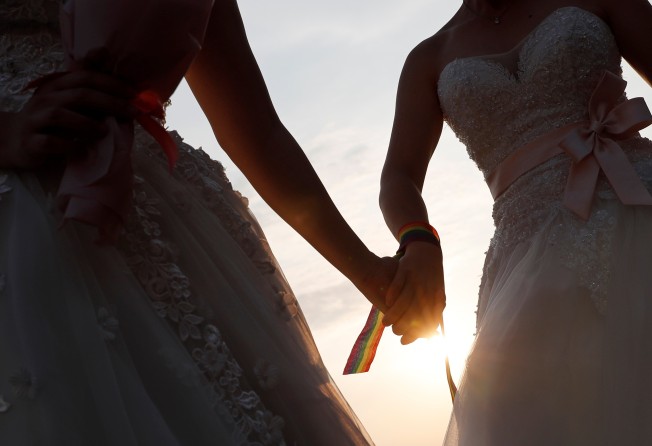Time for Hong Kong to officially recognise gay marriages, for the greater good of society
- It is not just about rights and benefits, but also about legal limits and obligations. For example, financial disclosure laws and conflict of interest legislation cover only opposite-sex spouses but not gay partners, and this is not in the public interest

There have been several court cases over the past few years — all eventually lost by the government in the Court of Final Appeal — that have shed light on the extent to which the administration denies rights and benefits to couples who are not married or, at least, not married in the eyes of the government.
Thanks to a British citizen known in court as QT, couples in civil partnerships and same-sex spouses can now obtain dependent visas for each other. More recently, Angus Leung Chun-kwong’s courage has ensured greater equality when it comes to taxation and medical and dental benefits for civil servants’ same-sex spouses.
There are more cases working their way through the courts. Nick Infinger wants to be able to live with his husband in public housing. Mk wants to legally formalise her relationship with her girlfriend without having to leave Hong Kong.
However, these cases — past and present — are just the tip of the iceberg. There remain many unlitigated rights and benefits available only to opposite-sex spouses and of which the public may be uninformed.
Many of these rights and benefits have seen the light of day in a report published by Allen & Overy and commissioned by the Equal Opportunities Commission on the recognition and treatment of relationships under Hong Kong law.
The report compares how opposite- and same-sex couples who are married or in civil partnerships, or who simply cohabit, are treated under Hong Kong legislation and government policies in 21 areas, including crime, death, employment, medical matters and public welfare.
It comes as no surprise that the rights and benefits denied to couples who are not, or cannot become, opposite-sex spouses are manifold and wide-ranging.
For example, opposite-sex spouses can jointly adopt children more easily, access all reproductive technologies in Hong Kong, live together in public housing, refuse to disclose their private discussions in criminal proceedings, and automatically inherit from each other where there is no will. Couples in other types of relationships cannot. These couples are also seriously disadvantaged when it comes to tax, and may pay more in income tax and stamp duty.
But the lack of rights and benefits is only half the story of how these couples are treated.
As revealed in the report, the other half is that the limits or obligations that the law places on married couples do not apply to them. This can, perhaps surprisingly, negatively affect the government, markets, creditors and the general public.
For example, it is more challenging for the government to pursue allegations of false trading in securities where the trading is between two women married to each other instead of between opposite-sex spouses.
As another example, directors of listed companies do not have to include the interests of their cohabiting partners when disclosing their interests in the companies they manage, which leaves the public less informed about who is really in control.
This is the case even though these couples can have the same emotional, social and financial connections (and conflicts of interest) that give rise to the need for special rules to apply to married couples.
So, to summarise, we now know that the government’s treatment of relationships other than opposite-sex marriage not only harms the people in those relationships, but indeed can harm everyone in Hong Kong.
It is time for the government to comprehensively review all Hong Kong legislation and government policies that apply differently depending on whether a person is married, and to change those laws and policies so that couples in relationships similar to opposite-sex marriage are treated the same — both for rights and benefits and for limits and obligations.
We now have a public road map — in the form of the report — on where the major issues are and their everyday impact on the lives of Hong Kong people. The government just needs to use it.
Will Yip is the principal editor of the report and an in-house lawyer for a financial institution in Hong Kong